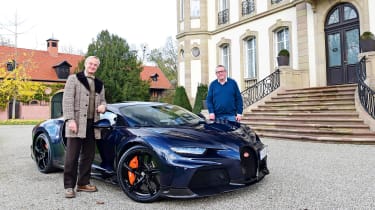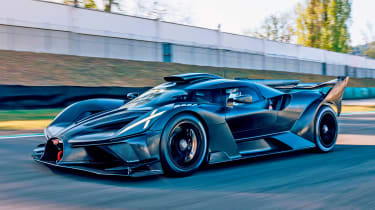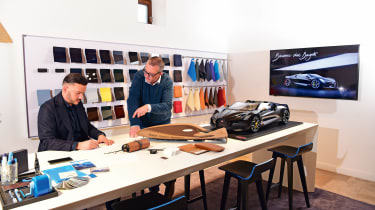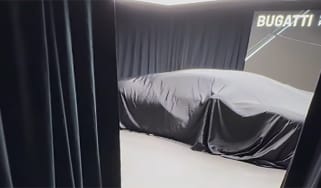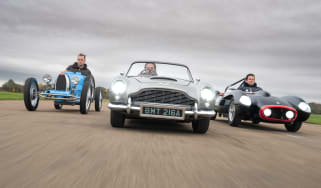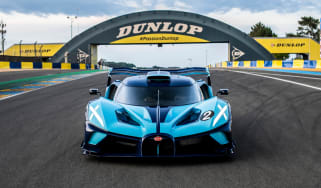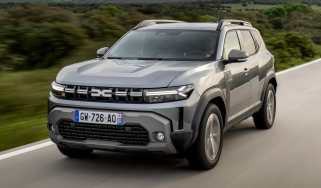The man who shaped Bugatti: Achim Anscheidt explores his hypercar legacy
Upon his retirement, the man who’s shaped all modern Bugattis reflects upon his stellar career with the ultimate supercar brand
When any of the world’s top car designers set their pencils back down on the desk for the very last time, they usually have an extensive back catalogue to look reflect on. Dozens of models, maybe a few unreleased gems that never saw the light of day, show-stopping concepts, sales figures that run into the millions...
Achim Anscheidt is different. The production numbers of vehicles created by him over the past two decades just about approach four figures. Only a couple of his concepts have ever been released in public. In fact, he has overseen the launch of just a handful of models. His total customer base is around 700 people.
And yet, as the newly retired head of design at Bugatti presented the marque’s next generation (unseen by us for now, but confirmed by the company to be a successor to the Chiron) to dealers a few weeks ago, he couldn’t quite hold back the tears. “I got emotional,” he admits. “I was trying hard, but I didn’t make it all the way through my speech; the last line got me. But I do feel it’s the right moment to hand over.”
The son of a multiple motorcycling champion, Anscheidt came up through design studios in the United States before joining VW’s advanced-design operations in Barcelona and Berlin. By the time he was installed as Bugatti design chief in 2004, the Veyron – an astonishing technical achievement, with its 8.0-litre W16 engine, four turbochargers, 10 radiators, 1,001PS (987bhp) and 250mph-plus top speed – was pretty much finalised, thanks to the legendarily ambitious engineering brief handed down by VW Group chief Dr Ferdinand Piëch, and the design work of Jozef Kaban.
The team had been so focused on making the Veyron happen, however, that Anscheidt quickly had to get to work on a plan for where Bugatti could be taken in the years that followed. The Veyron Grand Sport Vitesse and Veyron Super Sport, which set a new top-speed record of 268mph, were part of his plan.
So, ultimately, was the Veyron’s successor, the Chiron – which raised the bar even further, with 50 per cent more power than the original model and a top speed of more than 300mph. These were staggering gains, considering how much the envelope of what a car could do had already been stretched barely a decade earlier.
Clothing this sort of physics-bending, technical tour de force can’t have been easy. But Anscheidt says that being so closely intertwined with his engineering colleagues allowed him to do his job better. “If we take the move from Veyron to Chiron,” he recalls, “pretty much all of that development was about solving the thermodynamic problems that the Veyron still had at the time – while also delivering more power. I can still see Dr Piëch in front of me, saying: ‘And the next one’s going to have 1,500PS.’ And the engine chief taking a deep gulp!
“In the end, it actually made my life easier. I felt such a responsibility on my shoulders, just to change a Bugatti to the next generation or model on styling alone. When I saw the possibility that we could go from Veyron to Chiron driven pretty much just by helping the car perform better, I knew I could have my shape themes oriented towards it. It makes me happy if design comes together that way, and people don’t even know why it is – cooling the brakes, or allowing the engine to breathe better, whatever. In a way, the technical demands are liberating for me. You just need a good balance with your development chief – a good alliance. If you don’t have that, you’re already embarking on the wrong path.”
The overall shapes are one thing; what Anscheidt and his team have achieved is to keep evolving the offering, nudging the Veyron and Chiron into slightly different directions, whereby they can attract repeat orders from some customers, or pull in clients who weren’t entirely sold on the idea before. He cites the first of these ‘variants’ as his favourite creation: the Veyron Pur Sang, the bare-metal version of the hypercar.
“I went into the Atelier [the production area at Bugatti’s HQ in Molsheim, France] one day, and was inspired by how beautiful the construction of the Veyron was,” Anscheidt says. “It was all aluminium and carbon fibre. And, at the time, there was also a little bit of a stalemate for Veyron sales, and a request that we could help a couple of clients with special cars. So I said that we had to create something that represents what I saw in the Atelier. You just couldn’t get more authentic than this.
“At the time, there was a lot of concern about whether we could sell the five examples of the Pur Sang that we had committed to making. We had a special event in the evening of the Frankfurt Motor Show, I remember. They were all gone within 45 minutes.”
This affinity for where the brand can go, and what its clients will pay ever-higher sums of money for, has built Anscheidt’s reputation within Bugatti – to the point where he’s committed to at least one further year of consulting, working closely with group boss Mate Rimac. But it hasn’t been entirely smooth sailing; indeed, the relatively recent commitment to the track-only Bolide nearly proved Anscheidt’s downfall.
“That one nearly cost me my job,” he recalls. “It was painful. There was a time when the company was investigating whether we could have a second model that was supposed to be a CUV – maybe something in the direction of a Ferrari Purosangue, but with two doors, and more extreme. It was all over the press, to be honest.”
He continues: “But I said: ‘If you guys are doing this, and also having a sales price point below what we are offering today, around a million euros, you’ll be accused of selling out the company.’ So I suggested doing something that Porsche did, during the days when the Cayenne was introduced. What did the brand launch at the same time? The GT – the perfect strategy to sustain Porsche’s core brand appeal. So I pushed for a discussion about maybe developing a car that was really along the same philosophy at the [classic] Type 35.
“Committing to that was such a hard undertaking. And I could understand why, in a way – the Bolide is such a different thing, it’s not comparable to our normal sales channel at all. At one point I remember [then-boss] Stephan Winkelmann asking our commercial team: ‘How many examples of this car do you think you can sell?’ Let’s say there wasn’t a lot of confidence in the answer.
“Twelve weeks went by after we announced it, and we had sold 40 Bolides. Incredible! And the nice thing was that the CUV project fell away, but the Bolide carried on – a project close to our performance hearts.”
This nous for Bugatti’s brand values, and where its clients want it to go, are why – as the company gears up to publicly unveil its next chapter in 2024 – Anscheidt has already worked with his incoming successor, long-time deputy Frank Heyl, to lay out a timeline of blueprints that runs way beyond the next model, to the end of this decade. The man who has overseen many of the world’s fastest cars may be stepping back – but his legacy, for those who could afford his work and the millions of car fans who couldn’t, will run for a long time to come.
The man who adds that personal touch
There comes a point where I find myself laughing – not in amusement, but in admiration. We’ve been joined by Jascha Straub, who heads up Bugatti’s Sur Mesure personalisation division. It’s his job to fine-tune models for the brand’s clients – a process that has pretty much become the norm for the remaining W16 models – but he is also a one-time member of Bugatti’s exterior design team. And boy, does he like to draw.
He’s rather good at it, too – and as someone who would struggle to draw a recognisable profile pic of pretty much anything, I find the level of skill on display jaw-dropping. I’ve been asked to request a model, so I’ve suggested a Type 41 Royale, the stunning 6.4-metre-long classic with a history of smashing auction records.
To start with, there’s just a hastily drawn oval in the middle of an otherwise-blank page. But within two minutes, Straub has used this to establish perspective and proportion, and we already have something that looks like a Bugatti Royale appearing before us. His pencil – sharpened by a tool that he bought when he was a boy, not long before he joined Bugatti on a placement scheme – is a blur on the paper, and yet there’s not a single duff line on there. Before the five-minute mark he’s fleshing out the profile of this Royale’s tyres, adding the car’s subtle tail lip, playing with cross-lines in the glasshouse...
A ‘Jascha sketch’ is only one part of the customer-engagement process at Sur Mesure. “We start by greeting the clients here in Molsheim,” Straub explains. “We have lunch or a coffee, then we often visit the Atelier production workshops to see what’s in there; that can actually be a good starting point as inspiration for those people who have come here with, shall we say, a less focused view on what they would like. Then we move through to my office here, and the room next door, where we have a configuration suite and a wall-sized screen to play on.”
Straub continues: “In some cases a sketch might be part of what the client envisions for their own vehicle [Jascha worked on the Chiron Super Sport Golden Era, which featured artwork of generations of Bugattis on its exterior, but he has also created illustrations for cabin trim]. However, a lot of the time it’s a souvenir for the client, a small reminder that they are working with us to create something that is personal, something that is unique.”
We’re three sketches in now, and nearly done. Yet I can’t help raising a couple of potentially tricky subjects: namely taste and cost. The second of these is rarely discussed during the process, apparently, and Bugatti doesn’t issue many details – although it’s fair to say that the average Chiron personalisation mark-up is an additional 300,000 Euros, and this will rise for the forthcoming Mistral roadster.
But Straub is frank enough to admit that he does end up trying to steer some clients clear of their choices on colour and trim: “We’re always thinking of the brand, and whichever Bugatti it is, there aren’t many of them, so they tend to be Instagrammed around the world,” he says – an implicit acknowledgement that whatever is created is likely to be ‘out there’ pretty quickly.
“There’s trust between the client and I – maybe because we’ve worked together before on a different model, or we quickly build up a rapport. Ultimately it’s their creation, so we can’t say no to something that we know is technically feasible – but I’ve learned to be constructive in suggesting alternatives. Very rarely does it go the other way.”
Indeed, when I ask him to name his trickiest type of client, Straub doesn’t cite those who want something polarising. Instead, it’s those who don’t really know what they want at all. “Getting that early idea of the direction a client wants to take is the most nervous bit of the process,” he says. “It’s more difficult when they just tell me to come up with something, without any guidance on what they like.”
It’s hard to imagine anyone entering a Bugatti buying process like this. But it’s equally hard to imagine Straub being daunted by a blank sheet of paper.
Click here for our list of the best hypercars...

